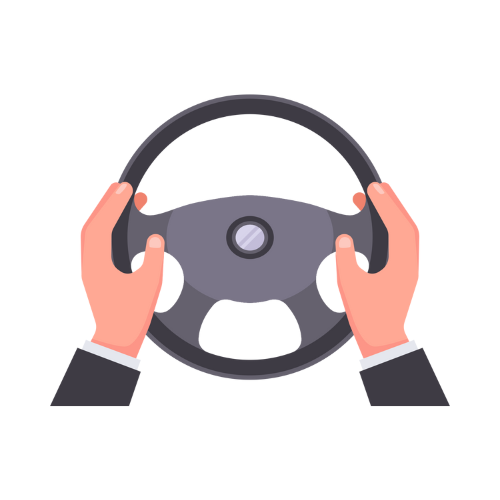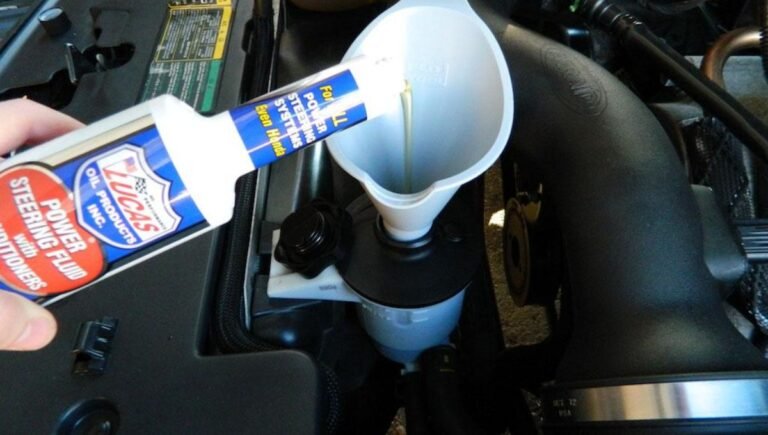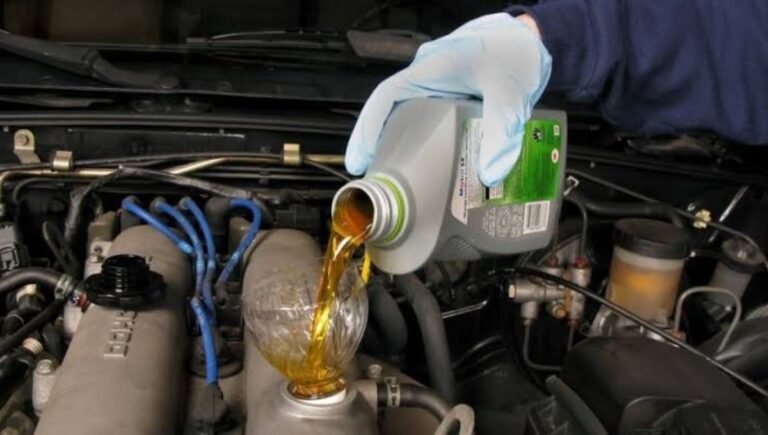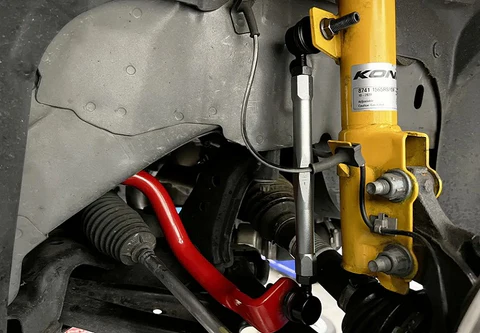Can Bad Struts Cause Steering Wheel Vibration? Uncover the Truth!
Yes, bad struts can cause steering wheel vibration. The struts are an integral part of the suspension system, and if they are worn out or damaged, they can cause the steering wheel to vibrate.
The suspension system of a vehicle is responsible for providing a smooth ride by absorbing the shocks and vibrations caused by the road. The struts play a significant role in maintaining the stability of the vehicle. However, when the struts are worn out or damaged, they can cause several problems, including steering wheel vibration.
This vibration can be felt through the steering column and can be an indication of a more severe problem. Therefore, it is essential to address any issues with the struts promptly. We will discuss the causes of bad struts, how to diagnose the problem, and the steps to fix it.
Introduction To Struts And Steering Wheel Vibration
When it comes to the smooth operation of a vehicle, the condition of the struts plays a crucial role. Bad struts can lead to a range of issues, including steering wheel vibration. In this article, we’ll explore the connection between bad struts and steering wheel vibration, understanding the role of struts in vehicle dynamics and the common symptoms of steering wheel vibration.
The Role Of Struts In Vehicle Dynamics
Struts are a critical component of a vehicle’s suspension system. They play a key role in maintaining the stability and control of the vehicle, particularly during cornering and rough road conditions. The struts are designed to absorb the impact of bumps and uneven surfaces, ensuring a smooth and comfortable ride for the driver and passengers.
Common Symptoms Of Steering Wheel Vibration
Steering wheel vibration is a common indicator of potential issues with a vehicle’s suspension system, including the struts. When struts are worn or damaged, it can lead to noticeable steering wheel vibration, especially when driving at higher speeds or over rough terrain. This vibration can be felt through the steering wheel, indicating a need for inspection and potential replacement of the struts.
Identifying The Causes Of Steering Wheel Vibration
Bad struts can indeed cause steering wheel vibration, as they affect the stability of the vehicle’s suspension system. When struts wear out, it can lead to a bumpy ride and steering issues, resulting in vibrations felt through the steering wheel.
Identifying and addressing this issue promptly is crucial for safe driving.
Identifying the Causes of Steering Wheel Vibration Tire Issues and Imbalances When tires are not properly balanced or have uneven tread wear, they can cause steering wheel vibration. Unbalanced tires create a wobbly effect, while uneven tread wear can lead to a shaky steering wheel. Brake System Components Worn-out brake components, such as warped brake rotors or sticking calipers, can result in steering wheel vibration. These issues cause the vehicle to shake when applying the brakes. Wheel Alignment and Suspension Improper wheel alignment can cause steering wheel vibration, as it affects the vehicle’s handling and stability. Additionally, worn-out suspension components like bad struts can lead to steering wheel vibration, impacting the overall driving experience.The Connection Between Struts And Steering Stability
When it comes to steering stability, the condition of your car’s struts can play a crucial role. Struts are a key suspension component that helps to absorb shocks and maintain tire contact with the road. However, worn or damaged struts can have a negative impact on your car’s handling, including steering wheel vibration. In this post, we’ll explore the connection between struts and steering stability, as well as how worn struts can affect driving.
Struts As A Key Suspension Component
Struts are a type of shock absorber that are integrated into the suspension system of most modern vehicles. Their primary function is to absorb shocks from bumps and uneven road surfaces, which helps to keep the tires in contact with the road. Additionally, struts provide structural support for the suspension and help to maintain proper alignment of the wheels.
How Worn Struts Affect Driving
Over time, struts can become worn or damaged due to normal wear and tear, as well as exposure to harsh driving conditions. When this happens, the struts may no longer be able to effectively absorb shocks, which can cause the tires to bounce and vibrate. This can lead to a number of handling issues, including:
- Steering wheel vibration or shaking
- Poor handling and stability
- Uneven tire wear
- Increased stopping distance
If left unchecked, worn struts can also lead to damage to other suspension components, such as the tires and steering system. It’s important to have your struts inspected regularly and replaced as needed to ensure optimal driving performance and safety.
Analyzing Strut Damage And Steering Wheel Vibration
When it comes to analyzing strut damage and steering wheel vibration, it is important to understand the correlation between these two issues. Bad struts can indeed cause steering wheel vibration, which can affect the overall performance and safety of your vehicle. In this section, we will explore the signs of bad struts and how they can contribute to steering wheel problems.
Symptoms Of Bad Struts
There are several signs that indicate your vehicle’s struts may be damaged. It is crucial to recognize these symptoms early on to prevent further issues and ensure a smooth driving experience. Here are some common indicators of bad struts:
- Excessive bouncing or dipping of the vehicle when going over bumps or uneven surfaces.
- Uneven tire wear, which can be observed by inspecting the tread pattern.
- Difficulty in steering or controlling the vehicle, especially during turns.
- Noise, such as knocking or clunking sounds, when driving over rough roads.
- Leaking fluid from the strut housing, which may appear as oily residue.
Correlation With Steering Wheel Issues
Now that we understand the signs of bad struts, let’s explore how they can cause steering wheel vibration. The struts play a crucial role in maintaining the stability and control of your vehicle, as they help absorb shocks and maintain tire contact with the road surface. When the struts are damaged or worn out, they are unable to perform their function effectively, leading to various steering wheel issues, including:
- Steering wheel vibration, which can be felt at higher speeds or when turning.
- Difficulty in maintaining a straight line while driving, as the steering may feel loose or unresponsive.
- Pulling to one side, where the vehicle tends to drift to the left or right without input from the driver.
- Uneven tire wear, as the misalignment caused by bad struts puts additional stress on specific areas of the tires.
It is important to address these steering wheel issues promptly, as they not only affect the comfort of your ride but also impact the safety of your vehicle. If you notice any of these symptoms, it is recommended to have your struts inspected and replaced if necessary.
Evaluating The Impact Of Struts On Vehicle Handling
Bad struts can indeed cause steering wheel vibration, impacting vehicle handling. The condition of struts plays a crucial role in the smooth functioning of the steering system. If the struts are worn out or damaged, it can result in steering wheel vibration, affecting the overall driving experience.
Regular evaluation of struts is essential to ensure optimal vehicle performance.
Steering Response And Control
One of the key aspects to consider when evaluating the impact of struts on vehicle handling is the effect on steering response and control. Bad struts can cause noticeable vibrations in the steering wheel, which can greatly affect the driver’s ability to maintain control of the vehicle. When the struts are damaged or worn out, they are no longer able to effectively absorb the shocks and bumps from the road, resulting in a loss of stability and a decrease in steering responsiveness.
These vibrations can be felt especially when driving over uneven surfaces or at high speeds. The steering wheel may shake or vibrate, making it difficult to keep the vehicle on a straight path. This can be not only unsettling but also dangerous, as it compromises the driver’s ability to maneuver the car effectively.
Safety Concerns With Damaged Struts
When it comes to the safety of the vehicle and its occupants, damaged struts pose a significant concern. Struts play a crucial role in maintaining the stability and handling of the vehicle, especially during sudden maneuvers or emergency situations. If the struts are worn out or damaged, they are unable to provide the necessary support and control, increasing the risk of accidents.
Furthermore, the vibrations caused by bad struts can also affect other components of the vehicle, such as the suspension system and tires. Excessive vibrations can lead to premature wear and tear on these components, compromising their performance and further jeopardizing the safety of the vehicle.
It is essential to address any issues with the struts promptly to ensure the safety of both the driver and passengers. Regular inspection and maintenance of the struts can help detect any signs of wear or damage early on, allowing for timely repairs and replacements.
Diagnostic Steps To Confirm Strut-related Vibration
When experiencing steering wheel vibration, it’s essential to determine whether bad struts could be the culprit. Here are the diagnostic steps to confirm if the vibration is related to the struts, allowing for a targeted approach to resolving the issue.
Professional Inspection Techniques
Professionals utilize advanced techniques to diagnose strut-related vibrations. These include:
- Visual inspection of the struts for signs of leakage, damage, or wear.
- Conducting a bounce test to assess the damping capability of the struts.
- Using specialized tools to measure the alignment and suspension components.
Diy Troubleshooting Tips
If you prefer troubleshooting on your own, consider these DIY steps:
- Visually inspect the struts for any visible signs of damage or leaking fluid.
- Perform a bounce test by pressing down on each corner of the vehicle and observing the rebound.
- Check for unusual tire wear patterns, which can indicate suspension issues.
Repairing Or Replacing Bad Struts
Bad struts can indeed cause steering wheel vibration, leading to an uncomfortable and potentially unsafe driving experience. Whether it’s through repairing or replacing the faulty struts, addressing this issue is crucial for a smoother and more stable ride. Don’t let bad struts compromise your steering control.
Repairing or Replacing Bad Struts When to Seek Professional Help If steering wheel vibration persists, consult a mechanic. Ignoring the issue can lead to further damage. Cost Considerations for Strut Replacement Strut replacement costs vary based on car model and labor fees. Budget for both parts and service.Preventive Measures And Regular Maintenance
Regular maintenance and preventive measures are essential to ensure optimal performance of your vehicle. Bad struts can indeed cause steering wheel vibration, highlighting the importance of addressing this issue promptly to maintain a smooth and safe driving experience. Stay proactive and prioritize regular maintenance to avoid potential problems down the road.
Routine Checks For Strut Health
Regular inspection helps identify strut issues early.- Look for visible signs of wear and tear
- Check for leaks or damage to the strut
- Inspect mounting hardware for tightness
Long-term Care For Steering Components
Maintain proper wheel alignment for smooth steering.- Rotate tires regularly for even wear
- Check and replace worn-out struts promptly
- Follow manufacturer guidelines for maintenance
Conclusion: Ensuring A Smooth And Safe Ride
Bad struts can cause steering wheel vibration, making for an uncomfortable and potentially unsafe ride. Regular maintenance and inspections can help prevent this issue and ensure a smooth driving experience.
The Verdict On Struts And Steering Wheel Vibration
Can bad struts cause steering wheel vibration? The answer is yes. Worn-out struts can lead to this issue, impacting your driving safety.
Maintaining Your Vehicle’s Suspension System
To ensure a smooth and safe ride, regularly inspect your suspension system. Look out for signs of worn-out struts to prevent steering wheel vibration.
Conclusion
Bad struts can indeed cause steering wheel vibration. It is crucial to address this issue promptly. Ignoring it can lead to further damage and compromise driving safety. Regular inspections and timely repairs are essential for a smooth and safe driving experience.
Addressing struts promptly can prevent potential risks.

Specializes on car underchassis & power steering repair. We have experienced mechanic to attend all your underchassis & power steering repair needs.



